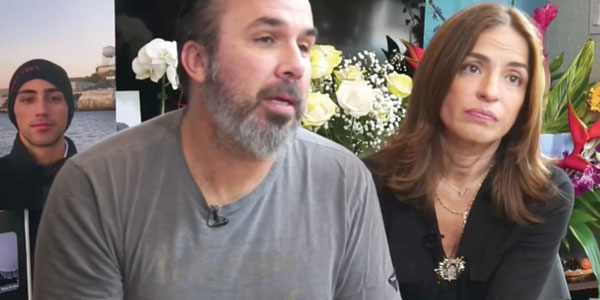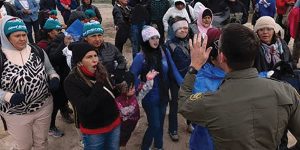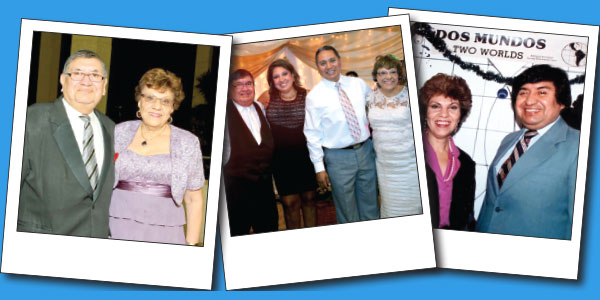
PARKLAND, Fla. — There is no greater pain than the loss of a child. I know this because I recently met with Manuel Oliver and Patricia Padauy, the parents of Joaquin Oliver, who was murdered at his high school on Feb. 14, along with 16 other students and teachers.
I talked with Manuel and Patricia at their home, just a few minutes away from the scene of the shooting. Photos of Joaquin, a smiling 17-year-old with his hair tips dyed blond, decorated the living room walls. The family left Venezuela in 2003 looking for a safer place to live, yet here they were in Florida, mourning their child.
Joaquin was kind, charismatic and sporty; he played basketball. The night before he was killed, he and his dad went out to get some flowers for Joaquin’s girlfriend for Valentine’s Day. He and his dad were close — Joaquin drank his first beer with his dad, and Manuel’s nickname for his son was Shorty, even though Joaquin, at 6 feet 2, was already taller than him.
I asked how Joaquin had spent his last day.
“I woke him up at 6:30. ‘Son, some coffee?’” Manuel said. “‘No, no, I’m going to shower because it’s Valentine’s Day. I’m going to shower and fix myself up.’ Then he grabbed the flowers, grabbed the Valentine’s Day card, grabbed his backpack, and I took him to school. Then he collected his flowers and his backpack and said, ‘Papi, I love you,’ and I told him, ‘Call me to let me know how it went.’ … I never received that call.”
That afternoon Nikolas Cruz walked into Marjory Stoneman Douglas High, the school from which he had been expelled, armed with an AR-15 semi-automatic rifle. A few minutes later, families began to receive emergency messages from some of the more than 3,000 students at the school reporting that a massacre was taking place.
Manuel and Patricia tried unsuccessfully to reach Joaquin. Andrea, Joaquin’s sister, tried to locate him through his Facebook friends, but nobody could find him.
“The hours passed and, of course, so did our hopes” Manuel said. “The FBI gathered all the parents of the kids who were missing [at a nearby hotel], and after many hours that group of parents gradually got smaller as kids were found. Finally there was only a small group left, and they called us one family at a time, and they told us that Joaquin was among the fatalities.”
Two days passed before they saw their son again. “We saw him again at the funeral parlor on Friday evening,” Patricia said.
I’ve actually lost count of the massacres that I’ve reported on in the U.S., so I’m very skeptical when politicians claim after one of these tragedies that things will change. But this time something is different. The students who survived this shooting have refused to remain silent. They are the ones saying Never Again. They are demanding not thoughts and prayers but real change, and they are exposing and humiliating the politicians who have received money from the National Rifle Association through the years.
This generation will be in charge in just a matter of years, so we have a head start. I trust them completely. I’ve spoken with many people connected with these sorts of tragedies, and I have never seen such a strong sense of resolve.
Joaquin’s parents are also confident in these students. “I’ve seen it from the inside,” Patricia said. “And I see that these kids are determined to do whatever it takes … I think this was the last straw.”
Manuel agreed. “As a parent, we fight nonstop for our kids, and even when our kids are gone, the fight must go on … We have to fight for our kids until we are gone too.”
He explained how he will continue fighting for Joaquin and for kids like him. “Do you know the saying, ‘Put yourself in my shoes?’” he asked me. “I am putting myself in his shoes. That’s our role now. … We have to put ourselves in the shoes of those young people. It’s their fight, and we must support them.”
I noticed then that Manuel was wearing a pair of black sneakers, basketball shoes that Joaquin had left behind. They both wore the same size. They will both keep on fighting.
(Watch the interview with Joaquin’s parents in Spanish here: bit.ly/2F7A3Lr)
(Jorge Ramos, an Emmy Award-winning journalist, is a news anchor on Univision.)
En Los Zapatos de Joaquín
PARKLAND, Fla. — No hay dolor más grande en la vida que perder a un hijo. Lo sé porque conocí a Manuel Oliver y Patricia Padauy, los padres de Joaquín Oliver, que el pasado 14 de febrero fue asesinado en su escuela junto a otros 16 estudiantes y maestros.
Me recibieron en su casa, apenas a unos minutos del lugar de la tragedia. Las fotos de Joaquín, con las puntas de su pelo divertidamente pintadas de amarillo, estaban ordenadas en la pared de la sala. La ironía es que la familia se había ido de Venezuela en el 2003 buscando seguridad y ahora, aquí, estaba de luto por su hijo.
Joaquín tenía 17 años de edad. Era generoso, carismático y deportista — jugaba basquetbol — y la noche anterior a su muerte salió con su papá para comprarle flores a su novia. Era una de las muchas complicidades entre los dos, como la vez en que habían tomado su primera cerveza juntos. Manuel le llamaba Enano a su hijo, aunque ya lo pasaba de altura.
¿Cómo fueron las últimas horas de Joaquín?
Manuel: “A las 6:30 lo levanto … Me dijo: ‘Me voy a bañar, porque es Valentine’s’ (el 14 de febrero). Agarró su tarjeta, agarró su mochila, agarró sus flores y nos fuimos al colegio. Llegamos. Tomó sus flores, tomó su mochila y me dijo: ‘Papi, te amo’. Y yo le dije: ‘Me llamas para que me digas cómo te fue.’ Nunca recibí esa llamada”.
Poco después de las 2 de la tarde, Nikolas Cruz entró a la misma escuela donde había sido expulsado, armado con un rifle semiautomático AR-15. A los pocos minutos, los padres y familiares de los más de 3.000 estudiantes comenzaron a recibir mensajes urgentes sobre la masacre que se estaba desarrollando en los salones de clase.
Manuel y Patricia trataron de comunicarse con Joaquín sin ningún éxito. La hermana de Joaquín, Andrea, trató de localizarlo a través de sus conocidos en Facebook, pero nadie sabía de él.
“Pasaron las horas, y pasaban también las esperanzas”, me contó Manuel. “Hasta que te dan la noticia que, hasta cierto punto, la estás imaginando. El FBI concentró a los padres de los niños que no habían aparecido [en un hotel cercano] y al cabo de muchas horas ese grupo de padres se fue reduciendo, porque los niños iban apareciendo. Al final quedó un pequeño grupo, nos llamaron familia por familia, y nos dieron la noticia de que Joaquín había sido una de las víctimas fatales”.
Dos días después se reencontrarían. “Lo volvimos a ver en la funeraria el viernes por la tarde”, me dijo Patricia.
Me ha tocado cubrir tantas matanzas en Estados Unidos que, literalmente, ya perdí la cuenta. Por eso mi enorme escepticismo sobre las promesas de los políticos de que algo va a cambiar.
Pero esta vez hay algo distinto. Las víctimas — en este caso, los estudiantes — están diciendo: “Nunca más”. No se han quedado callados. Están exigiendo un cambio real — ni palabras ni oraciones — y están exponiendo y humillando a todos los políticos que durante años han recibido dinero de la Asociación Nacional del Rifle. Si esta generación es la que se va a hacer cargo del país en el futuro, estamos bien parados. Confío plenamente en ellos.
He hablado con varios sobrevivientes y no había visto esa determinación antes. Es la misma que tienen los padres de Joaquín. “Me ha tocado de cerca, y veo a estos niños que están dispuestos a todo”, me dijo Patricia. “Creo ya que el vaso rebosó”.
Lo retoma Manuel. “Uno como padre lucha por los hijos en todo momento, y cuando los hijos se van, esa lucha tiene que continuar. Uno tiene que luchar por los hijos hasta que uno se va”.
Y luego me dice cómo.
“¿Conoces el dicho ‘ponte en mis zapatos’?” me pregunta. “Ese dicho tiene otra versión. Yo me estoy poniendo en sus zapatos. Ese es nuestro rol ahora. Nos tenemos que poner en los zapatos de estos jóvenes. La lucha es de ellos; nosotros tenemos que estar con ellos”.
Y es en ese instante que me doy cuenta que Manuel lleva puestos los zapatos tenis negros, esos del basquetbol, que dejó su hijo Joaquín. Sí, los dos calzan la misma talla. Los dos siguen en la lucha.
(Posdata. A Joaquín sí le dio tiempo de darle las flores a su novia. La entrevista de televisión con sus papás la puedes ver aquí: http://bit.ly/2F7A3Lr )










